Israel is the Jewish State of Sadism, Torture and Child Abuse – this is Starmer’s ‘rumbustious democracy’
A Boy of 17 with autoimmune disease is detained without trial indefinitely – an 80 year old man is beaten, blindfolded and left to freeze to death

If only Amal Nakhleh had been born Jewish then instead of occupying a cold cell he would be in an Israeli hospital receiving treatment for autoimmune disease. As it is he has been classified by the Israeli military and Shin Bet as a threat to Israeli security and that has meant his being held under Administrative Detention, or in plain language imprisonment without trial.
Of course, as even Corbyn accepted, Israel has an independent judiciary. So independent that they have a policy of never contradicting the army or police when it comes to ‘security’. So that the obvious injustice and absurdity of an ill 17 year old being a threat to the settler state’s ‘security’ is never challenged or questioned.
Internment without trial, as in Ireland, is always the last resort of the occupying colonial power, except in Israel’s case it is the first resort. It is true that the case against him was so thin that he was released by 2 Israeli military judges, in itself highly unusual in a ‘court’ system that convicts 99.7% of those who come before it. But don’t worry, such was the threat that this sick boy posed to the mighty Israeli state that Israel’s Shin Bet, an internal security police and MI5 rolled into one (very much like the Nazi SD (Sicherheitsdienst) immediately locked him up anyway and literally threw away the key.
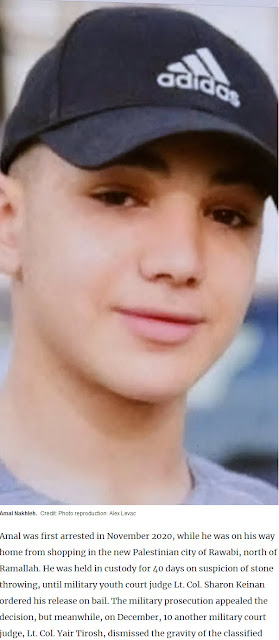
Amal Nakhleh. Credit: Photo reproduction: Alex Levac
Of course it’s not racist what has happened and if you say it is then you will be a prime candidate for expulsion from Sir Keith’s Labour Party. Because under the IHRA misdefinition of anti-Semitism, calling Israel what it is, a racist state (or endeavour to use their quaint language), is ‘anti-Semitic.’ It really doesn’t matter whether or not it is true , the fact is that it is anti-Semitic!
However we won’t dwell any longer on Amal as he has been born into the wrong tribe and there really is nothing that can be done about that. One thing is certain. You cannot change your ‘race’ which is why Israel’s Conversion Authority refuses on principle to allow Palestinians to convert to Judaism.
This is much the same as in Nazi Germany where once a Jew always a Jew even if you converted to Christianity. Hence why that hybrid creature, the Jewish Christian was born.
Then there is Omar Abdalmajeed As’ad who was bound, beaten and tossed to the ground, much as if he was a farm animal. And here I ask you to sympathise, not with Omar, because he’s dead, but the soldiers whose treatment led to his death.
You would have to have a heart of stone not to understand their plight. Normally when soldiers kill a Palestinian, there is a formal ‘investigation’ (if that’s the right word) and then the army announce that the soldiers were defending themselves.
So it was no surprise when a military report said that none of the troops involved “would be indicted, nor have they been suspended.”

The building in Jiljilya where Omar Abdalmajeed As’ad died. Credit: Alex Levac
It quoted military lawyers representing the soldiers as saying As’ad had been “lawfully detained during the operation in accordance with procedures” and “his death is not related to the conduct of the military force”
But then news got out that Omar also had dual American citizenship and that is when things began to go wrong, well not that wrong. The military had then to conduct a slightly more serious ‘investigation’ which found, under American pressure, that what happened was ‘serious and unfortunate’.
Indeed it was ‘a moral failure and a failure of judgment and severely harms human dignity” Indeed senior officers told Ha’aretz that the soldiers “didn’t see a human being in front of them”. One might ask when did the Israeli military see Palestinians as human beings but I refrain from doing so for fear of being accused of ‘anti-Semitism’.
Strong words indeed. So strong and serious that one commander will be rebuked, and two subordinate company and platoon commanders will be immediately dismissed. Of course there is no question that they will be arrested and charged with murder or at the very least gross negligence manslaughter. After all Omar was, when all is said and done, a Palestinian and therefore a threat to ‘security’.
Omar is dead so there really is no point in crying over spilt milk (or blood). The soldiers concerned were all haredi, i.e. ultra orthodox and according to the Talmud, a non-Jewish life is not worth the same as a Jewish life.
Of course these ancient rules had long ago fallen out of use before the Israeli state came on the scene. And then they were resurrected in order to legitimise Israel’s colonial practices. Because you can’t argue with God can you?
You will, I hope, sympathise with the poor and unfortunate soldiers. How were they to know that a Palestinian they were killing had dual nationality? It was not as if he was carrying his passport. Anyway he didn’t look like an American. He wasn’t even White. Secondly he didn’t at any stage tell them he was an American. How were these soldiers to know that? All in all it is an unfortunate accident.
You can see, I hope the point I am making. In 99.99% of times no one would have said anything. Ayelet Shaked, the Interior Minister would have described them as the ‘salt of the earth’. Prime Minister Bennet would have railed anyone who dared criticise the ‘defensive bulwark’ that the IDF provides. This is really a tragedy of immense proportions.
Because of an accident of birth and circumstances, three Israelis face having their futures tarnished. Two have already been dismissed from the army, which is a disgrace in Israel (although they can expect to be readmitted when the fuss dies down). Some people, god forbid, not satisfied with this punishment are asking for their pound of flesh and for them to be brought before a court.
I am sure you will agree that in the circumstances these young men have already been punished enough for a mistake that was in no way their fault. And if anyone suggests otherwise then they too are anti-Semitic, as my good friend, that friend of Israeli child abuse, Louise Ellman will confirm.
Fortunately in Israel we have no problem with this incessant anti-Semitism that is taking over our lives because as Emily Thornberry once proclaimed Israel is a ‘beacon of light and democracy.’
Below are 2 articles describing the events above in more detail.
Tony Greenstein
For Over a Year, Israel Has Jailed a Palestinian Teen With a Rare Disease. There’s No Trial in Sight
Ha’aretz 11.2.22.
Two Israeli military judges have ordered Amal Nakhleh’s release, but the larger predatory system has insisted on keeping him jailed

Amal Nakhleh and his father Muammar, during better times.
Credit: Photo reproduction: Alex Levac
Feb. 11, 2022
What do the Shin Bet security service and the Israel Defense Forces have against a teenager in high school, whose father says he doesn’t know the difference between ideology and biology, who suffers from a rare autoimmune disease and who in 2020 underwent surgery to remove a tumor from his chest? Why do they imprison him repeatedly, without trial, without an indictment, without any consideration for his age or his health?
No one knows what the suspicions are against Amal Nakhleh, who was in the 11th grade at the time of his first and second arrests, whose father is the director general of a broadcasting company in Ramallah and whose mother is a gynecologist in the Jalazun refugee camp, near that same city. Not does anyone know how long the teenager will remain in prison – apparently for stone throwing. Two Israeli military judges have already ordered his release after examining the security information in his case, but the larger predatory system has insisted on keeping him jailed, and to that end, has issued an administrative detention order – incarceration without trial; arbitrary and unconstitutional – that is renewed every few months. That has happened several times so far, and the end is not necessarily looming on the horizon.
As if his disease and the operation he underwent weren’t enough, last week Nakhleh also fell ill with COVID-19 and was taken to the hospital in Ramle Prison. He can’t be vaccinated, because of his immunosuppressive disorder. He was returned to his cell earlier this week.
Amal will turn 18 next week. His current administrative detention is due to end in mid-May, though it might be extended again. His father, a Ramallah resident, is the head of the Wattan Media Network, which employs about 100 journalists. In the organization’s headquarters, high up in an office tower in the heart of the city, the staff was busy this week preparing a campaign supporting a one-state solution. In the past, the Israel Defense Forces raided the company’s offices and studios several times – most recently in 2012 – carrying off equipment that was never returned.
Muammar Nakhleh, 50, a journalist, lawyer and left-wing activist, has two children. Osama, now almost 19, was arrested for the first time at the age of 13 and spend two years of his life behind bars. Amal has now been incarcerated for a total of 14 months. Their parents are divorced, and the sons divide their time between their mother, Iman, in Jalazun, and their father, in Ramallah.
Amal was first arrested in November 2020, while he was on his way home from shopping in the new Palestinian city of Rawabi, north of Ramallah. He was held in custody for 40 days on suspicion of stone throwing, until military youth court judge Lt. Col. Sharon Keinan ordered his release on bail. The military prosecution appealed the decision, but meanwhile, on December, 10 another military court judge, Lt. Col. Yair Tirosh, dismissed the gravity of the classified evidence presented to him and also ordered Amal’s immediate release. On January 21, 2021, however, Amal was rearrested, with no explanation. A few days later, reserve military court judge Shimon Ashual approved the request – submitted by Col. Naama Rosen Grimberg, an intelligence officer in Central Command – to issue a six-month administrative detention order against Amal.
When Amal was 15, a benign tumor was discovered in his thymus gland, below the breastbone. A few months later, a Ramallah hospital recommended that he undergo surgery in Hadassah University Hospital in Jerusalem or in the city’s St. Joseph Hospital. His father was unable to obtain an entry permit to Israel for him, but Amal and his father succeeded in getting to the hospital by other means, and he underwent surgery there.
A few days after being released from the hospital Amal was arrested at the Atara checkpoint when leaving Rawabi. A few weeks after he was released, a Palestinian intelligence official called his father and told him to report to them urgently with his son. Muammar Nakhleh said he would produce his son the following day. Two hours later, Palestinian intelligence called again: “Where are you? Get here immediately. The Israelis are going to kidnap Amal.” Amal was then questioned by Palestinian investigators. He was asked about stone throwing at the Beit El settlement and about some of his Facebook posts, and was freed after an hour. That same night, Israeli troops arrested Amal at his mother’s home in Jalazun. Since January 21, 2021, he has been in prison.
Amal told his father that he was incarcerated because of his “biological thoughts.” Muammar says he meant his “ideological thoughts.” This week, in his Ramallah office, Muammar mentioned the confusion on his son’s part several times. “He is too childlike to be arrested for dangerous thoughts.”
Amal suffers from a rare autoimmune disease called myasthenia gravis, which affects the connections between muscles and nerves, and can sometimes affect muscles used for breathing and also the limbs. The disease is connected to the tumor in the thymus gland for which Amal had surgery. It’s a chronic, incurable disease, and he requires medicative treatment and constant monitoring.

Muammar Nakhleh, Amal’s father, in his office at the Wattan Media Network in Ramallah. “Amal is too childlike to be arrested for dangerous thoughts,” he says.Credit: Alex Levac
Dr. Bettina Birmans, a neurologist at Shaare Zedek Medical Center in Jerusalem, examined Amal on June 14, 2021, in Ofer Prison, at the request of the family and the NGO Physicians for Human Rights. She reported that Amal complained of shortness of breath while walking, apparently due to his illness, and recommended an urgent CT scan, because, she wrote, “a considerable possibility exists that there is a malignant growth and precious time should not be wasted.” The scan was carried out on July 22, at Hadassah, and happily no evidence of tumor recurrence was found, as the radiologist, Prof. Dorit Shaham, wrote. According to Amal’s father, stressful situations are harmful to his son’s condition, and cause him to have trouble eating and breathing. His ocular muscles are also affected.
Joint List MKs Aida Touma-Sliman and Ofer Cassif tried to obtain Amal release, due to his condition, via Defense Minister Benny Gantz, and also attempted to ensure that he was receiving his medications. On September 22, 2021, Cassif sent a message to Gantz urging Amal’s release “in light of his medical condition and the danger to his health in conditions of incarceration.” To no avail. His parents worried that he’d contract the coronavirus since he is unvaccinated, and are concerned in general that the tumor will recur. When he indeed fell ill with the virus and was hospitalized in the Ramle Prison, MK Touma-Sliman inquired about his condition in the defense minister’s bureau, as Amal’s parents had no way to communicate with him; she was told he was in good condition. Amal, it bears noting, is still a minor, until next week.
There’s no way of knowing whether he will be released when his current, fourth term of administrative detention ends on May 18. Requests for his release by Palestinian and international human rights groups have also been rejected. “We are holding him for security reasons,” was the response they got. Every attempt to find out what security dangers justify such a lengthy, arbitrary detention, why this high-schooler is not being placed on trial if he is so dangerous, and what will become of these dangers when he is released one day – all these questions have gone unanswered. Indeed queries like those never get a response in cases of administrative detention, even when minors are involved.
The IDF Spokesperson’s Unit this week responded to Haaretz’s query on the subject as follows: “Amal Nakhleh was arrested by the security forces on suspicion of involvement in terrorist activity. After information was collected about him which showed involvement in military activities, dealings with weapons and participation in public terror activities, an order for his administrative detention was issued that was extended from time to time in light of his danger to the region’s security. The present detention order is valid until May 2022. All the orders, including the present one, were examined and authorized by the military court.
“In the deliberations relating to the judicial review of administrative detention, the court examines all the pertinent data in the matter, including every medical document presented to it, and weighs medical and other circumstances within the framework of its decision. We cannot comment on the data here, for reasons of personal privacy, and because the deliberations are held in camera.”
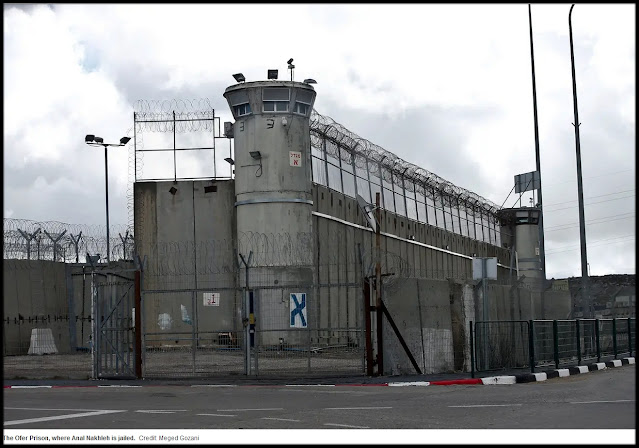
The Ofer Prison, where Anal Nakhleh is jailed. Credit: Meged Gozani
If the suspicions are indeed so grave, one must ask: Why has this young man not been put on trial?
Amal took his high-school matriculation exams in prison. He was supposed to enter university in the fall. At first, he wanted to study communications, but his father persuaded him to major in political science. “If you have something against him – tell us, tell his lawyer,” Muammar tells us. Iyad Hadad, a friend of the family and a field researcher for the Israeli human rights organization B’Tselem, adds, “Especially given his age and his medical condition.”
Amal – “hope” in Arabic – was so named when he was born preematurely, in the sixth month of pregnancy. The physicians told his parents that he wouldn’t survive but asked his father to give him a name nonetheless, for the death certificate they would issue. Muammar didn’t hesitate for a second, and named him Amal. Muammar, by the way, is named for Muammar Gadhafi, the former president of Libya; his brothers, too, have the names of Arab leaders.
Amal played on the Palestine children’s soccer team, and before his arrest was set to travel to South Korea with the team. His dream was to get to Barcelona; his hero is Lionel Messi. “His model is not his father or his mother, it’s Messi,” his father says.
Muammar admits that he is not optimistic about his son’s release in May, because when deciding on the last extension the authorities did not specify that it would be the last one. Last week the father was supposed to visit his son in prison, but the visit was canceled in the wake of Amal’s hospitalization with the coronavirus. During the year in which the young man has been imprisoned, Muammar has been permitted to visit him only twice.
On Sunday this week, Muammar met another youth from the Jalazun refugee camp who was incarcerated with Amal and was released. The teenager told him that Amal speaks to God and asks why he disappoints him time after time.
We Will All Die. But Why Like That?’
Details still emerge weeks after Israeli troops violently arrested an 80-year-old Palestinian. Omar Abdalmajeed As’ad was bound, beaten and tossed to the ground. An autopsy found that the brutality he suffered resulted in a fatal heart attack, but arrests are yet to be made
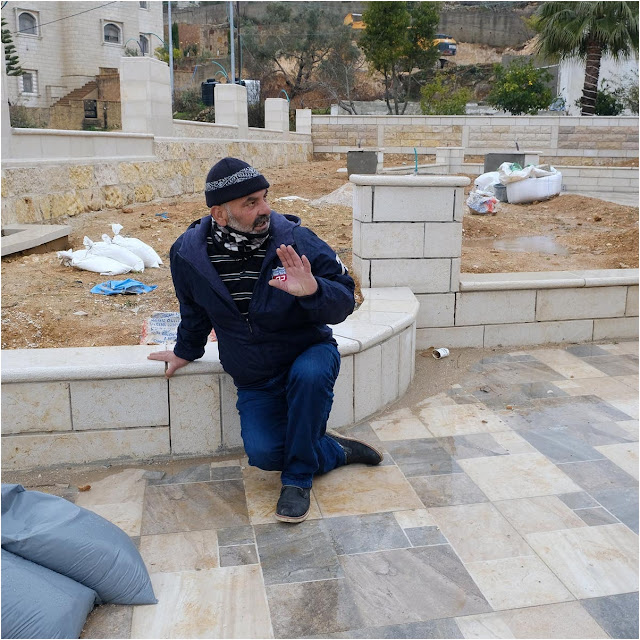
Mamduh Abd A-Rachman, one of the other Palestinians brought to the site where Omar As’ad lost his life. “We’ll all die,” As’ad’s brother says. “But why like that?”Credit: Alex LevacGideon Levy, Alex Levac
Jan. 28, 2022
It was a few minutes after 3 A.M. Omar Abdalmajeed As’ad was driving from the home of a friend on the western side of his village to his house, on the eastern side. A few hours earlier he had dropped off his wife at home after they’d gone shopping together and had coffee with friends. At around 10 P.M. he went to visit a friend. Since returning from the United States, 11 years ago, As’ad had been spending a lot of time with childhood friends from the village. They sipped coffee, played cards and talked late into the night, each time at someone else’s house. The night of January 12 was no different. At 3 A.M. he drove home.
On the dark, empty road, he suddenly noticed a few Israel Defense Forces soldiers at the street corner where Ali’s Grocery is located, in the center of town. Jiljilya, located in the Ramallah District and one of the most affluent locales in the West Bank, is replete with palaces. Some of its residents immigrated to the United States years ago, where they prospered and then built themselves mansions back home. A drive around affords quite a spectacle: Houses of marble that look like they’re made of marzipan, each more luxurious than the next, most of them empty, awaiting their owners’ family visits in the summer, or waiting for them to retire.
Omar and his wife Mahani also wanted to grow old together in their village, after they left it for America in 1970. For the first 11 years they lived in Chicago, then they moved to Milwaukee, where they owned a few supermarkets. Mahani is 78, Omar was 80, and they were married for 58 years. They built their home in Jiljilya 15 years ago – a relatively modest residence compared to most of the other neighboring villas. They lived there alone: Their five daughters, two sons and their grandchildren remained in America. Everyone in the family, including the grandparents, has U.S. citizenship.
It was very cold, that Wednesday night. The soldiers ordered As’ad to stop. The previous night, too, IDF jeeps had invaded Jiljilya, which is typically one of the quietest locales in the West Bank. Maybe that’s why the fighters from the army’s ultra-Orthodox Netzah Yehuda (“Judah’s Eternity”) Battalion 97 raided it: It’s easy to train, to mete out abuse for no reason, to demonstrate control and power, or just enjoy a break from the routine and the boredom there. This ludicrously named battalion has a rich record of acts of abuse against Palestinians. This time it was the turn of the inhabitants of Jiljilya.
The forces decided to detain without prior warning anyone who dared drive in the street that night. The soldiers claimed afterward, in testimony they gave to the army, that this was the order they had received – from whom it isn’t clear. According to residents, dozens of troops descended on the village that night; five to seven of them manned a makeshift checkpoint they’d erected in town.
An eyewitness, Rada Bakri, 63, who lives above the site where the soldiers positioned themselves, was awake and had read in the social networks that the army had invaded again. He peeked out of the window of his second-floor apartment – according to an account he later gave to Iyad Hadad, the Ramallah District field researcher for the Israeli human rights organization B’Tselem – and saw a few soldiers leap into the middle of the road and stop As’ad’s car. Shouts quickly erupted between them and the elderly man who wanted only to get home.
After about five minutes a soldier opened the door of the vehicle and forcibly removed the driver, according to Bakri. The soldiers shackled his hands with black plastic handcuffs, later found at the place where he died, blindfolded him and stuffed pieces of flannelette into his mouth.
About 120 meters separate the spot where As’ad was initially detained and the place where the soldiers force-marched or dragged him. That occurred along the dirt path that leads to the new mansion of Mohammed As’ad, a relative of Omar’s, who also returned, in his case recently, from the United States and is living in Ramallah until his luxurious two-story home will be ready – very soon now. Soldiers had wandered about near the empty structure the night before; on this night they would haul five Palestinians into its marble-floored courtyard.
It was very dark, and eyewitness Bakri still can’t say whether As’ad walked on his own or was dragged by force. As’ad was a heavyset man with a plodding walk, his family related early this week when we visited. They found one of his shoes in his car – meaning that if he was walking, it was with one foot exposed to the wet, cold earth. They added that the soldiers had subjected him to a body search: He was left without a coat, wearing only a shirt and sweater; they stripped off his red keffiyeh, which was found later in a corner of the courtyard.
As’ad would have passed through the stone gate into the courtyard of the imposing new house, with its red-tiled roof and stone pillars in front. There, the soldiers threw him onto the ground, face-down, like one would toss a sack, next to the bags of sand being use in the construction, which are still there. Hadad believes that As’ad died within a short time, perhaps soon after he was hurled to the ground. An 80-year-old man on a frigid night, frightened, humiliated, probably panicked. “Why didn’t they at least allow him to sit, bring him a chair?” mourners asked this week, in the family’s house.

The path down which Omar Abdalmajeed As’ad was dragged or force-marched by Israeli troops.Credit: Alex Levac
In the meantime, a van approached the soldiers’ checkpoint at the bottom of the road, carrying two Palestinian greengrocers who were on their way to the wholesale market in the town of Beita. It was about 3:30 A.M. Mamduh Abd A-Rachman, 52, from the nearby village of Arurah, was in the passenger’s seat. This week he accompanied us to the site where As’ad was taken that night – followed by him and his colleague – in order to reconstruct the elderly man’s last moments.
The soldiers stopped the van and ordered the driver to proceed to the mansion, where the two occupants were told to get out and hand over the keys and their ID cards. They were forced to sit in the courtyard; Abd A-Rachman showed us how he sat on his leg, because the marble was unbearably cold. The two newly snared captives were ordered to sit a few meters apart. They weren’t handcuffed, but a soldier trained his weapon on them. They were told to keep their eyes on the ground. They couldn’t see anything. On the way from the van, Abd A-Rachman said he tried to tell the soldiers that he was ill, but that of course was of no interest to them; they forced his head down and ordered him to shut up.
A large number of soldiers had meanwhile gathered in the courtyard, which had become a temporary detention facility. A few minutes later, two more Palestinians were brought in, also greengrocers on their way to Beita. They too were made to sit on the ground and keep their eyes down. The detainees were seated a few meters apart, apparently to prevent them from mounting an uprising. One of the soldiers now drove As’ad’s car, which had remained at the checkpoint, to the mansion.
And thus they sat, on the cold floor – four living detainees with eyes downcast and one who was most likely dead by that time. They were drowsy and freezing; Abd A-Rachman fell asleep. The four didn’t know that someone had been brought there before them. Abd A-Rachman recalled that at one point he felt that he was touching something, but never imagined it was a dead body, thinking it was one of the bags of sand scattered about. A short time later, two soldiers sat down near Abd A-Rachman. Afterward it would emerge that they had come to remove As’ad’s handcuffs: Apparently they realized he was dead and wanted to get out as fast as possible, while eliminating any evidence.
An autopsy performed this week by three Palestinian physicians, under the auspices of the Palestinian Authority, revealed that As’ad, who had pre-existing health problems, died as a result of a heart attack. The examiners noted that he had received blows to the head and arms and that the blindfold he wore was so tight it caused bleeding. They determined that the reason for death was “a sudden cessation of myocardial activity due to psychological tension brought on by the external violence to which he had been exposed.” Another source added that the initial autopsy findings suggested that As’ad was “severely beaten” and suffered from “rough and violent treatment” – as evidenced by numerous bruises.
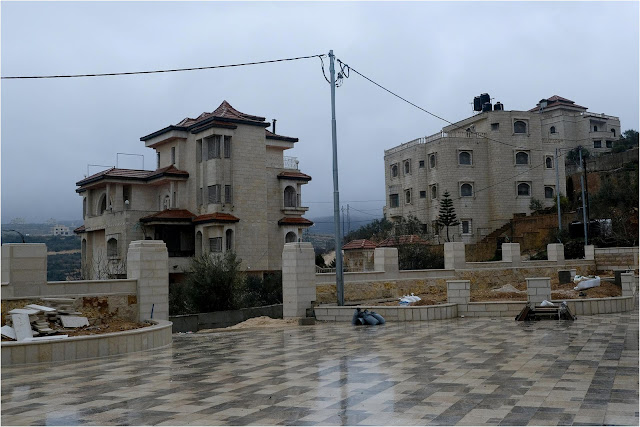
The area where Omar Abdalmajeed As’ad’s body was found, in Jiljilya.Credit: Alex Levac
The IDF Spokesperson’s Unit issued the usual statement this week: A Military Police investigation is now underway. A spokesperson for Military Defense, which is representing the soldiers, stated: “They [the soldiers] were engaged in operational activity with the aim of preventing terrorism. The Palestinian in question was detained lawfully during the activity in accordance with procedures, in light of his behavior, which endangered the soldiers and the force, and he was released at the conclusion of the activity in sound condition and with no need for medical intervention. The circumstances of his death are not related to the conduct of the military forces.”
While retreating from the courtyard, the soldiers aimed their rifles at the detainees. Abd A-Rachman says he got up to ensure that they were indeed gone, and then noticed something covered up next to him. He was aghast to discover it was a human body. As’ad’s face was covered with some sort of cloth, perhaps the coat he had been stripped of. Abd A-Rachman remembers that he shouted that there was a body, but the others replied that it was probably a sack of cement. “No, it’s a person!” he screamed.
A check of the man’s pulse and breathing revealed that he was lifeless. Within a few minutes the village doctor, who lives several dozen meters from the site, arrived and tried to resuscitate As’ad, but in vain. The group then carried him on a stretcher to the physician’s clinic and administered electric shocks, but to no avail. As’ad was dead. It was 4:09 A.M. The soldiers left the ID cards and car keys they had confiscated on the roof of As’ad’s car, it was later discovered.
In her home in Milwaukee, As’ad’s daughter, Hiba, 32, read on social media that someone from her parents’ village had died. She called the house immediately. Mahani, her mother, awoke in a fright. This week the widow told us tearfully that she was sure her daughter was calling because she had quarreled with her husband. But Hiba asked where her father was. The devastating answer came soon enough. Now Mahani is sitting in her living room in a traditional black dress and weeping. The family has already hired a caregiver for her, as she remains alone in the house.
Two days before As’ad’s death, his younger brother Amer, a 59-year-old gardener with an American accent who lives in Racine, Wisconsin, had arrived in Jiljilya. He hadn’t seen his brother since As’ad left the United States over a decade beforehand and now he had come to visit. Unlike him, As’ad’s children didn’t manage to get to the funeral; since they don’t have Palestinian ID cards, they had to request Israeli visas, which are extremely hard for Palestinians to get.
Since their return, Mahani and Omar had been unable to leave the village: Their old ID cards had been confiscated due to their prolonged absence; even if they had somehow traveled abroad with their U.S. passports, they would not have been allowed to return. Shortly before we arrived this week, the new ID cards they had waited for all these years arrived – but Omar was no longer alive. Amer had only managed to see him briefly before he died.
Mother and brother are sobbing now. “We will all die,” the brother says. “But why like that?”
U.S. Lawmakers Demand Probe Into 80-year-old Palestinian’s Death After Israeli Detention
PA officials say Palestinian-American Omar Abdalmajeed As’ad, who previously lived in Wisconsin, had a heart attack after being bound and beaten by Israeli soldiers; the IDF says he had been released much earlier
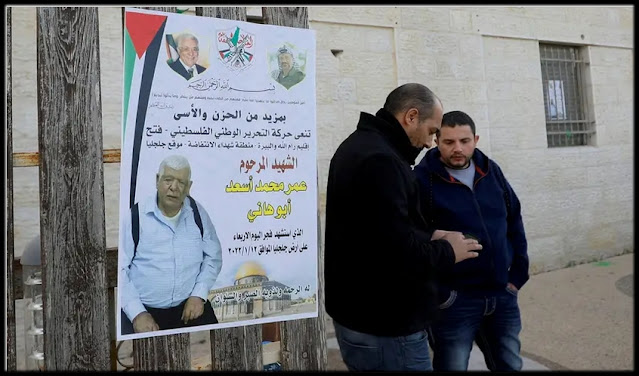
Men stand next to a poster of Palestinian Omar Abdalmajeed As’ad, 80, in Jiljilya village in the West Bank, on Wednesday. Credit: MOHAMAD TOROKMAN/ REUTERS Ben Samuels
Ha’aretz Jan. 15, 2022
U.S. lawmakers are demanding a thorough investigation into the death of an 80-year-old Palestinian-American resident of the West Bank after he was detained by Israeli soldiers.
Palestinian officials say Omar Abdalmajeed As’ad, who previously lived in Milwaukee, was pulled from his car by Israeli forces on his way home in the village of Jiljilya. They allege that the soldiers bound, blindfolded and beat As’ad, who then succumbed to a heart attack in the early morning Wednesday.
As’ad’s body was found more than an hour later, according to vegetable seller Mamdouh Elaboud, who said he was himself detained for 20 minutes, then released.
The Israeli military confirmed he had been held by soldiers “after resisting a security inspection,” but said he was then released and only later, in the morning, found dead near his village. Israel’s military police have launched an investigation into the incident.
Sen. Tammy Baldwin, who represents As’ad’s state of Wisconsin, called the incident a “horrible tragedy that demands a thorough investigation.” She extended her condolences to his family, “including those in Wisconsin who are mourning this tragic loss and deserve answers.”
Rep. Rashida Tlaib, the lone Palestinian-American serving in Congress, called the circumstances leading to As’ad’s death “outrageous” and urged U.S. Secretary of State Antony Blinken to investigate.
Rep. Ilhan Omar shared an Instagram Story regarding the incident, posting “Life taken under the cruelty of occupation. When will these victims get accountability?”
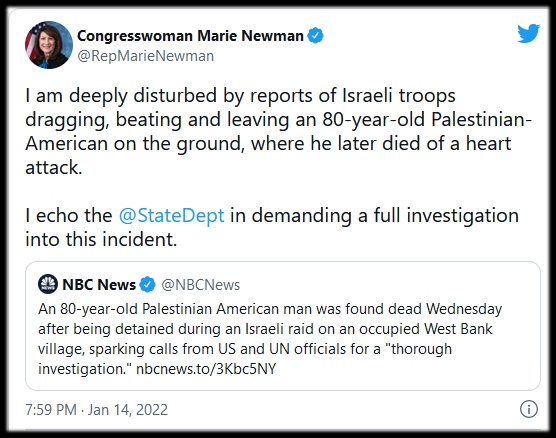
Rep. Betty McCollum, long one of Congress’ more outspoken critics of Israel’s treatment of Palestinians, called As’ad “another victim of this cruel occupation,” and Rep. Marie Newman, the first-term lawmaker who has quickly fashioned herself into a leading advocate for Palestinians, said she was “deeply disturbed” and echoed the State Department’s support of an investigation into the death.
Rep. Debbie Dingell joined the call for a full and thorough investigation, called the circumstances surrounding his death “gravely concerning.”
The lawmakers’ demands come days after State Department spokesperson Ned Price confirmed the United States has been in touch with Israel about As’ad’s death.
“We’ve been in touch with the government of Israel to seek clarification about this incident, [and] the Israeli Defense Forces have indicated there’s an ongoing investigation into the matter. And we support a thorough investigation into the circumstances of this incident,” Price said.